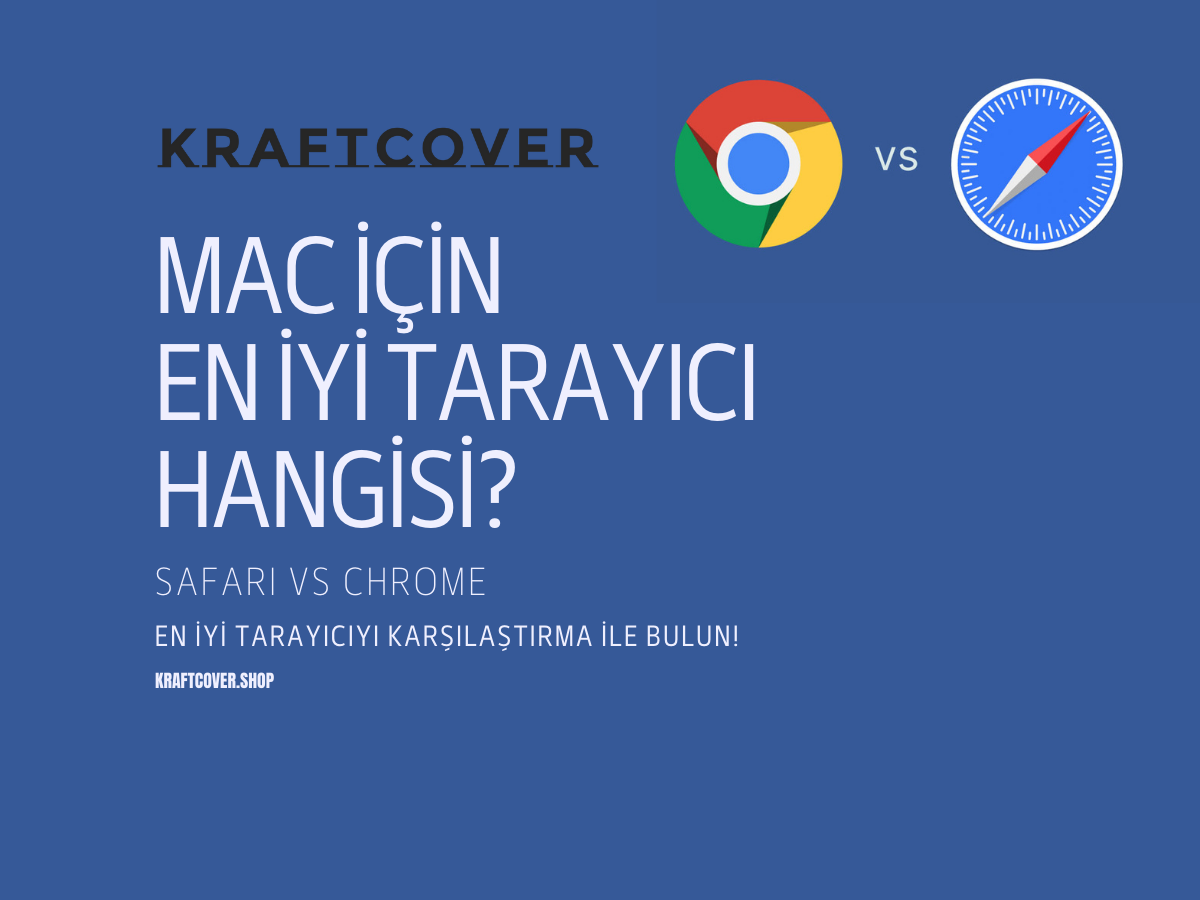Tarayıcı seçimi, Mac kullanıcıları için verimlilik ve performansı doğrudan etkileyen kritik bir karar. Ancak, tarayıcı seçiminde tek bir doğru cevap yok. Hem Apple’ın macOS için geliştirdiği Safari hem de Google’ın çapraz platformlarda sunduğu Chrome, farklı kullanıcı ihtiyaçlarına hitap eden güçlü seçenekler sunuyor. Peki sizin için en iyisi hangisi? Tarayıcı tercihinizi yaparken, performans, güvenlik, eklenti desteği ve kullanım alışkanlıklarınızı göz önünde bulundurmalısınız. Bu yazımızda, iki tarayıcıyı kapsamlı bir şekilde inceleyerek size en uygun olanı bulmanızda rehberlik edeceğiz.

Safari: Mac İçin Maksimum Uyum ve Enerji Verimliliği
Apple’ın kendi geliştirdiği Safari, macOS ile tam uyumlu olarak çalışır ve sistem kaynaklarını minimumda kullanarak MacBook’unuzun performansını optimize eder. MacBook kullanıcılarının Safari'yi tercih etmesinin ana sebeplerinden biri, batarya ömrü üzerindeki olumlu etkisidir. Apple’ın yaptığı testlere göre, Safari ile MacBook’lar Chrome’a kıyasla yaklaşık %20 daha uzun batarya ömrü sunar. Safari’nin enerji verimliliği, özellikle uzun süre prizden uzakta çalışan kullanıcılar için büyük bir avantaj sağlar.
Performans ve Sistem Kaynakları
Safari, macOS sistem mimarisiyle tamamen uyumlu olduğundan, daha az RAM ve CPU kullanır. Chrome ise, özellikle çoklu sekme kullanımında, yüksek RAM tüketimi nedeniyle Mac'inizi yavaşlatabilir. Eğer aynı anda birçok uygulama kullanıyorsanız, Safari’nin daha dengeli performans sunduğunu fark edeceksiniz.
Güvenlik ve Gizlilik
Apple’ın gizlilik odaklı politikaları Safari’de de kendini gösteriyor. Safari, varsayılan olarak üçüncü parti çerezleri ve izleyicileri engelleyerek tarayıcı geçmişinizi korur. Ayrıca Safari’de yerleşik bir "Takip Önleme" (Intelligent Tracking Prevention) özelliği bulunur. Bu özellik, reklam verenlerin ve izleyicilerin internet üzerindeki hareketlerinizi takip etmesini önler. Eğer gizliliğiniz sizin için öncelikliyse, Safari burada öne çıkan tarayıcıdır.
Safari’yi uzun saatler boyunca kullanırken, MacBook’unuzu korumak da en az yazılım kadar önemlidir. KraftCover’ın sunduğu MacBook Kılıfı cihazınıza en az tarayıcı kadar özen göstermenizi sağlar.

Chrome: Eklenti Zenginliği ve Çapraz Platform Uyumluluğu
Google Chrome, sadece bir tarayıcı olmanın ötesinde geniş bir ekosistem sunar. Dünya genelinde masaüstü tarayıcı pazarında %60’ın üzerinde bir paya sahip olan Chrome, Mac kullanıcıları arasında da popülerdir. Mac kullanıcılarının yaklaşık %65’i Chrome’u tercih ederken, %35’i Safari kullanmaktadır. Chrome’un en güçlü yanı ise zengin eklenti desteğidir. Web geliştirme, içerik yönetimi, reklam engelleme ve daha pek çok alanda binlerce eklentiye kolayca erişim sağlayabilirsiniz.
Eklenti ve Kişiselleştirme
Chrome Web Store’daki geniş eklenti yelpazesi, tarayıcı deneyiminizi kişiselleştirmenizi sağlar. Safari’ye göre çok daha fazla eklenti seçeneği sunan Chrome, özellikle tarayıcı tabanlı uygulamalar ve geliştiriciler için biçilmiş kaftandır. Öte yandan, bu zengin eklenti desteği aynı zamanda Chrome’un daha fazla RAM tüketmesine yol açabilir.
Çapraz Platform Desteği
Eğer birden fazla cihaz kullanıyorsanız, Chrome’un sunduğu çapraz platform desteği büyük bir avantajdır. Google hesabınızla oturum açarak sekmelerinizi, yer imlerinizi ve hatta tarayıcı geçmişinizi cihazlar arasında senkronize edebilirsiniz. Windows, Android ve Linux gibi farklı platformlar arasında geçiş yapıyorsanız, Chrome bu konuda Safari’den daha esnek bir seçenek olacaktır.
Chrome ile senkronize çalışırken, MacBook’unuzu da yanınızda güvenle taşımanız önemli. BagMe Taşıma Çantası cihazınızı darbelere ve çizilmelere karşı korur, hem şık hem de fonksiyonel bir taşıma çözümü sunar.
Performans Karşılaştırması: Safari mi Chrome mu?
Performans söz konusu olduğunda, her iki tarayıcı da güçlü özelliklere sahip olsa da, kullanım alışkanlıklarınıza göre tercih yapmanız önemlidir. Eğer uzun süreli pil ömrü ve düşük kaynak kullanımı önceliğinizse, Safari Mac kullanıcıları için daha iyi bir tercih olacaktır. Ancak geniş eklenti desteği ve platformlar arası uyum sizin için önemliyse, Chrome öne çıkan bir seçenek olabilir. Mac kullanıcılarının %35’i Safari, %65’i ise Chrome kullanmayı tercih etmektedir.
|
Özellik |
Safari |
Chrome |
|
Pil Verimliliği |
Yüksek (Mac'e optimize) |
Orta (Daha fazla pil tüketir) |
|
Eklenti Desteği |
Kısıtlı |
Geniş |
|
Platform Uyumluluğu |
Sadece Apple cihazlarında |
Tüm platformlarda |
|
Güvenlik ve Gizlilik |
Takip önleme özelliğiyle güvenli |
Google verileri işleme politikası |
|
Performans |
Mac’te daha hızlı |
Daha fazla RAM tüketir |
Hangisi Sizin İçin Daha İyi?
Her iki tarayıcı da kullanıcıların farklı ihtiyaçlarına hitap eder. Eğer gizliliğinize önem veriyorsanız, MacBook’unuzun batarya ömrünü uzatmak istiyorsanız Safari sizin için ideal bir seçenek olabilir. Eğer geniş eklenti desteği, çapraz platform desteği ve Google servislerine sorunsuz erişim sizin için daha önemliyse, Chrome daha uygun olabilir.
Uzun Süreli Kullanımda MacBook Performansı Nasıl Optimize Edilir? İçeriğimizi inceleyerek MacBook’unuzun performansını artıracak ipuçlarını keşfedebilirsiniz.



